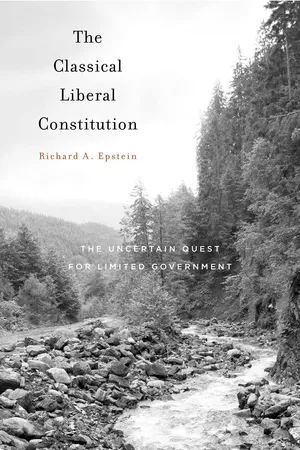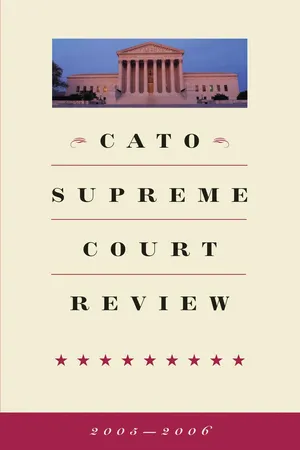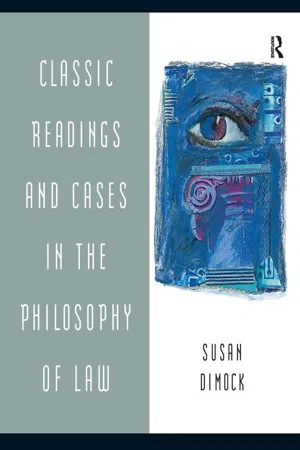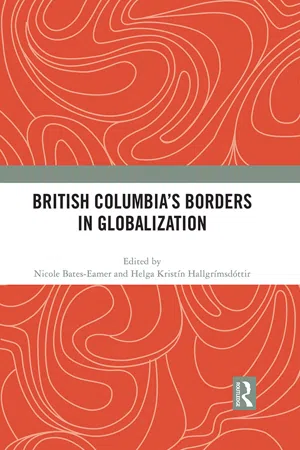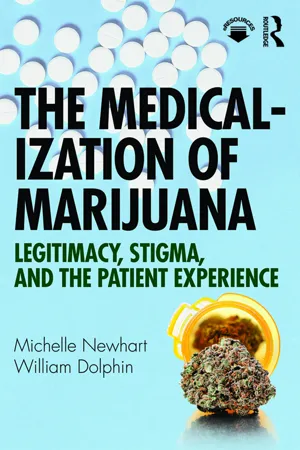Politics & International Relations
Gonzales v Raich
Gonzales v Raich was a US Supreme Court case that dealt with the federal government's authority to regulate marijuana use under the Commerce Clause of the Constitution. The court ruled that the federal government could prohibit the use of marijuana, even in states where it was legal for medicinal purposes, because it had a substantial effect on interstate commerce.
Written by Perlego with AI-assistance
Related key terms
Related key terms
1 of 4
Related key terms
1 of 3
5 Key excerpts on "Gonzales v Raich"
- eBook - ePub
- Richard A. Epstein(Author)
- 2014(Publication Date)
- Harvard University Press(Publisher)
The answer is more doctrinal than institutional. What he did was decide to show that the principle of enumerated powers was alive even within the Wickard framework, because he could be clever enough to beat Justice Jackson at his own game, by demonstrating that federal enforcement of the gun law did not substantially influence either the quantity of goods shipped in interstate commerce or the price at which they were shipped. So there are limits on the commerce power after all. But the cleverness that drove this rationale ensured that his exceptions would look like parched fruit on the vine—incapable of any further growth. To be sure, the usual five-to-four split in United States v. Morrison 7 struck down that portion of the Violence against Women Act of 1994 8 that purported to make a dormitory rape a federal offense on the ground that its indirect economic consequences were not sufficient to support federal power. But that decision had little practical effect, for here, as in Lopez, the challenged conduct was long held criminal under state law. What really matters is how the Lopez synthesis plays out when there is a serious policy conflict between the federal government and the states. That issue came to the fore with Gonzales v. Raich, 9 in which the clash between the California Compassionate Use Act, 10 which legalized the use of marijuana for medical purposes, and the federal Controlled Substances Act, 11 which rendered illegal the private possession and use of marijuana, is too plain to dispute. The private parties structured their transactions so as to eliminate all possible interstate economic transactions. Respondent Monson grew her own marijuana; respondent Raich received hers as a gift from two friends. Both used it under medical supervision. Neither could find any other substitute. But for a six-member Supreme Court majority, all this fine-tuning was to no avail - eBook - ePub
- Mark K. Moller(Author)
- 2006(Publication Date)
- Cato Institute(Publisher)
27Raich undermined the Lopez-Morrison framework for limiting federal power in three separate ways. First, Raich adopts a definition of ‘‘economic’’ that is almost limitless, thereby ensuring that virtually any activity can be ‘‘aggregated’’ to produce the ‘‘substantial[] [e]ffect [on] interstate commerce’’ required to legitimate congressional regulation under Lopez and Morrison.28 According to the Raich majority, the word ‘‘economic’’ ‘‘refers to ‘the production, distribution, and consumption of commodities.’ ’’29 Almost any human activity involves the ‘‘distribution’’ or ‘‘consumption’’ of a commodity. Even having dinner at home surely involves the ‘‘consumption’’ of the commodity of food, while giving a birthday present to a friend entails commodity ‘‘distribution.’’Raich also makes it easier for Congress to impose controls on even ‘‘noneconomic’’ activity by claiming that it is part of a broader ‘‘regulatory scheme.’’30 Here the Court greatly expanded Lopez’s statement that Congress can regulate noneconomic activity if it is an ‘‘essential part of a larger regulation of economic activity.’’31 The Raich majority ignored the Lopez requirement that the regulation of the noneconomic activity must be an ‘‘ essential’’ part of a ‘‘regulatory scheme’’ intended to control interstate ‘‘economic activity.’’32 If ‘‘essentiality’’ is no longer required, the regulation of almost any activity can be claimed to be part of a broader regulatory scheme. Indeed, the government could satisfy the requirement by claiming that any new regulation of noneconomic activity is just an addition to one of the numerous regulatory programs already in existence.33 - Susan Dimock(Author)
- 2016(Publication Date)
- Routledge(Publisher)
Raich V. Ashcroft
The plaintiffs-appellants in this case are two seriously ill California residents, Angel McClary Raich and Diane Monson, who use marijuana for medical purposes, and two others, John Doe Number One and Two, who grow marijuana for Raich’s medical use. Medical use of marijuana is legal in California under its Compassionate Use Act. They filed suit against the attorney general of the United States and the administrator of the Drug Enforcement Agency, the defendants-appellees, seeking an injunction against the enforcement of the federal Controlled Substances Act against them, and a declaration that it is unconstitutional to the extent that it impedes the right of those possessing, manufacturing, or providing marijuana legally under the California law to do so. They also ask for a declaration that the Controlled Substances Act cannot be enforced against them on the grounds that they have a medical necessity defense. The Court of Appeals here only hears a part of the case: the district court had denied the request for a preliminary injunction, and that decision is all that is under appeal here.The U.S. Congress has authority to regulate drug trafficking under the commerce clause of the Constitution, which grants it power to regulate international and interstate commerce. The appellants argued that this power does not extend to their activities, however, because their activities are entirely intrastate, noncommercial, and aimed at providing marijuana only for their own personal medical use. The Court of Appeals agreed with them that the class of activities in which they were engaged differed from that covered by the commerce clause. Thus the Appeals Court ruled that the appellants had demonstrated that their constitutional challenge had sufficient merit to make their success at trial on that issue likely. Because the appellants had also demonstrated that they would face serious hardships if they were denied marijuana, and the government had not shown that the public interest would be seriously harmed by allowing them access to marijuana consistent with California law, the Court of Appeals issued the preliminary injunction they sought and remanded the case to the district court.- eBook - ePub
- Nicole Bates-Eamer, Helga Kristín Hallgrímsdóttir(Authors)
- 2021(Publication Date)
- Routledge(Publisher)
Trouble on Main Street: Mackenzie King Reason Race and The 1907 Vancouver Riots . Toronto, ON: Allen Lane.- Gonzales v, Raich. 2005 . (03-1454) 545 U.S. 1. 352 F.3d 1222, Vacated and Remanded. US Supreme Court . https://www.law.cornell.edu/supct/html/03-1454.ZS.html/ (accessed April 11, 2018).
- Grenville, A. 2008 . Mapping Spirituality and Values in the Elusive Utopia. In Cascadia, The Elusive Utopia: Exploring the Spirit of the Pacific Northwest , ed. D. Todd, 56–63. Vancouver, BC: Ronsdale Press.
- Haglage, A. 2015 . Life in Prison for Selling $20 of of Weed. Daily Beast , February 27. https://www.thedailybeast.com/life-in-prison-for-selling-dollar20-of-weed (accessed online February 17, 2019).
- Hari, J. 2015 . Chasing the Scream: The First and Last Days of the War on Drugs . New York, NY: Bloomsbury.
- Hawthorn, Tom. 2011 . Yippies in Love: Exploring the Vancouver Riot - of 40 Years Ago. Maclean’s Magazine , June 22. https://www.theglobeandmail.com/news/british-columbia/yippies-in-love-exploring-the-vancouver-riot—of-40-years-ago/article625436/ (accessed April 11, 2018).
- Holcomb, A. 2008 .
Marijuana: It’s Time for a Conversation . Seattle, WA: ACLU of Washington Foundation. https://aclu-wa.org/sites/default/files/media-legacy/attachments/Marijuana%20Booklet2010reading%20copy.pdf (accessed April 11, 2018).- Huffington Post, B.C. 2013 . Sensible BC Petition Falters With a Month to Go. Huffington Post , November 8. http://www.huffingtonpost.ca/2013/11/08/marijuana-pot-sensible-bc-petition_n_4242524.html (accessed April 11, 2018).
- Hull, Dorothy. 1916 . The Movement in Oregon for the Establishment of a Pacific Coast Republic. The Quarterly of the Oregon Historical Society 17, no. 3: 177–200.
- Hune-Brown, N. 2013 , March. Grow Industry. The Walrus , March 12. https://thewalrus.ca/grow-industry/ (accessed April 11, 2018).
- Hutchinson, S. 2015 . How the F.B.I. Made ‘Winners Don’t Use Drugs’ the Arcade Motto of the ‘90s. Inverse Entertainment
- eBook - ePub
The Medicalization of Marijuana
Legitimacy, Stigma, and the Patient Experience
- Michelle Newhart, William Dolphin(Authors)
- 2018(Publication Date)
- Routledge(Publisher)
6 the government prevailed. In 2005, the U.S. Supreme Court overturned the Ninth Circuit, ruling in a 6–3 decision that the government was acting within its authority in prosecuting state-qualified medical cannabis patients because cannabis grown for personal medical use is indistinguishable from illicit cannabis, and allowing patients to opt out of the illicit market could affect supply and demand, and ultimately price. This was the same reasoning the earlier court had used to conclude that Roscoe Filburn’s excess wheat cultivation affected interstate commerce, even though it never left his farm.The composition of the Supreme Court’s split decision in Raich would seem to defy normal ideological alignments of the court, with Justice Clarence Thomas making a rare break from Justice Antonin Scalia in joining the dissent of Justice Sandra Day O’Connor and Chief Justice William Rehnquist. Yet, it reveals what may be the nexus of this issue’s breadth of political appeal. While more liberal attitudes about drug use may be commonly associated with more liberal political views, attitudes about cannabis use, medical and otherwise, tend to align with libertarianism of both left and right. This has been seen in the bipartisan sponsors of legislation in both houses of Congress, with Rand Paul (R, KY) and Cory Booker (D, NJ) in the Senate and Dana Rohrabacher (R, CA-48) and Earl Blumenauer (D, OR-3) in the House cosponsoring various federal reform bills. We will also see this libertarianism echoed by the patients themselves in chapter 9 .Conservative jurists and legal scholars of the originalist mindset championed by Justice Scalia 7 have argued for more restraint of federal powers, which is sometimes called a return to states’ rights. Devolving authority to individual states allows them more freedom to determine laws governing everything from where and how someone can carry a firearm to if and when they can obtain an abortion. Historically, the most fraught confrontation over federal versus state control of policing was seen in the constitutional challenges to the Jim Crow segregation laws of the southern states, beginning with Brown v. Board of Education
Index pages curate the most relevant extracts from our library of academic textbooks. They’ve been created using an in-house natural language model (NLM), each adding context and meaning to key research topics.
Explore more topic indexes
Explore more topic indexes
1 of 6
Explore more topic indexes
1 of 4
